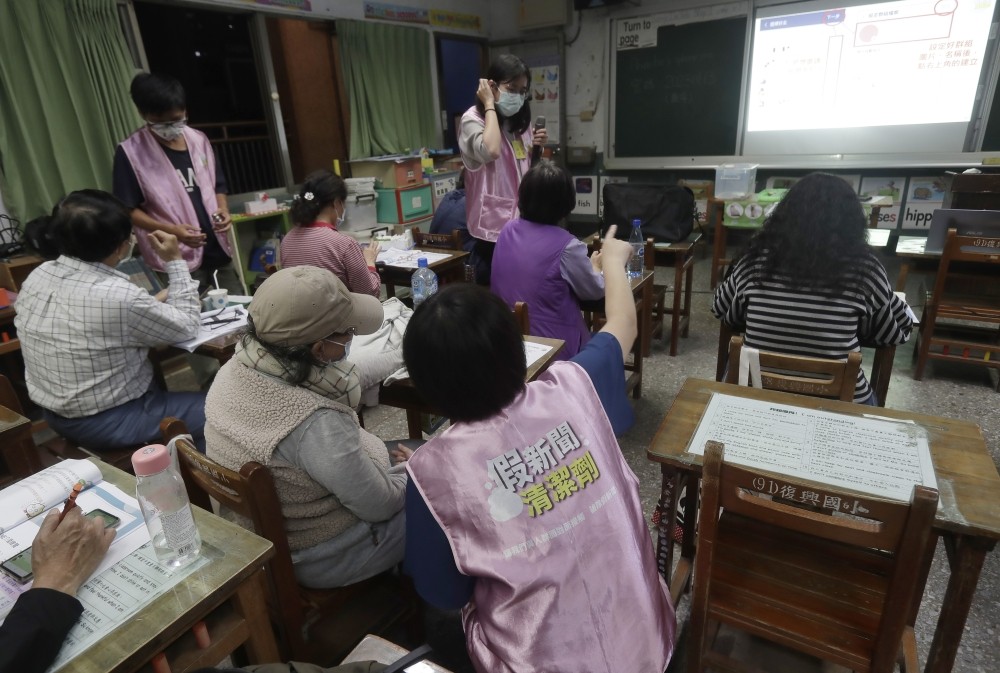01/04/2024
01/04/2024

TAIPEI, Taiwan, April 1, (AP): Their days often began at the crack of dawn.
They’d head out to a church, a temple, a park and set up a stall. They’d seek out seniors in particular, those who are perhaps the most vulnerable citizens of the information-saturated society that has enveloped them. To get people to stop and listen, they’d offer free bars of soap - a metaphor for the scrubbing that they were undertaking.
They’d talk to people, ask them about their lives and their media consumption habits. They’d ask: How has fake news hurt you? They’d teach techniques to punch through the static, to see the illogic in conspiracy theories, to find the facts behind the false narratives that can sometimes shape our lives.
Nearly six years later, with just one formal employee and a team of volunteers, Fake News Cleaner has hosted more than 500 events, connecting with college students, elementary-school children - and the seniors that, some say, are the most vulnerable to such efforts.
Its people are filling up lecture halls and becoming a key voice in an effort as pressing here as anywhere: scrubbing Taiwan of disinformation and the problems it causes, one case at a time.
Like any democratic society, Taiwan is flooded with assorted types of disinformation. It touches every aspect of a person’s life, from conspiracy theories on vaccines to health claims aimed at promoting supplements to rumors about major Taiwanese companies leaving the island.
Despite its very public nature, disinformation has a deeply personal impact - particularly among Taiwan’s older people. It thrives in the natural gaps between people that come from generational differences and a constantly updating tech landscape, then enlarges those gaps to cause rifts.
"They have no way to communicate,” says Melody Hsieh, who co-founded the group with Shu-huai Chang in 2018. "This entire society is being torn apart, and this is a terrible thing.”
Taiwan is already home to several established fact-checking organizations. There’s Co-Facts, a well known AI-driven fact-checking bot founded by a group of civic hackers. There are the Taiwan Fact Check Center and MyGoPen. But such organizations presume that you’re at least somewhat tech-savvy - that you can find a fact-check organization’s website or add a fact-checking bot.
Yet many of the people most affected are the least tech-savvy. Fake News Cleaner believes addressing this gap requires an old-school approach: going offline. At the heart of the group’s work is approaching people with patience and respect while educating them about the algorithms and norms that drive the platforms they use.
Hsieh says she was moved after seeing too many instances of division because of fake news: a couple that divorced, a mom who kicked her kid out of the house. Many such stories surfaced in 2018 when Taiwan held a national referendum on a number of social issues including on nuclear energy, sex education, and gay marriage.
At their second-ever event, Hsieh and Chang met a victim of fake news. A vegetable seller told them he’d lost sales because people had read that the vegetable fern he planted and sold, known locally as guomao, caused cancer. Business faded, and the vendor had to sell off part of his land. For a year, even restaurants didn’t order from him.
Keep up the work, he told them - it’s needed.
At a community center hosted by Bangkah Church in Taipei’s Wanhua neighborhood, a crowd of seniors listen to 28-year old Tseng Yu-huan speak on behalf of Fake News Cleaner.


